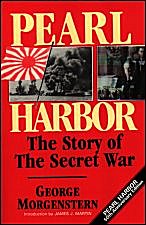 |

George Morgenstern:
Pearl Harbor
The Story of the Secret War
This is the book about Roosevelt's secret war policy which the
American government tried in vain to suppress!
"Yesterday, December 7, 1941 - a date which will live in infamy - the United
States of America was suddenly and deliberately attacked by naval and air forces of the Empire
of
Japan.... Always will we remember the character of the onslaught against us." Franklin D.
Roosevelt, on December 8, 1941.
"America provoked Japan to such an extent that the Japanese were forced to attack Pearl Harbor.
It is a travesty on history ever to say that America was forced into war." Oliver Lyttelton,
British production minister, addressing the American Chamber of Commerce on June 20,
1944
This book is intended to give the facts and examine the meaning of Pearl Harbor. The facts have come to the American public in disjointed form, from many sources, and with many interpretations.
For years before Pearl Harbor Mr. Roosevelt had talked of peace. For months he had schemed for war. For the United States, World War II - "the most unpopular war in history", to use the apt descriptive phrase of Lieutenant General Hugh A. Drum - officially began on December 7, 1941, with the Japanese attack upon Pearl Harbor. The assault which brought America into the war was the greatest naval disaster in American history and drew intense attention from the American public; the surprise was all the greater since diplomatic negotiations aiming at a settlement of differences had been ongoing between Tokyo and Washington for months. The attack on Pearl Harbor provoked a complete reversal of the American public mood. All of America united in the battle cry, "Remember Pearl Harbor".
The disaster of Pearl Harbor was originally investigated solely as a failure of the commanders of the fleet and garrison at Hawaii. As more and more facts came to light, it became clear that any balanced study of the events of December 7 could not be thus restricted. Pearl Harbor was the terminal result of a complex of events moving in many parallel courses. National ambition and international intrigue, diplomacy, espionage, politics, personalities, and the personal responses of men to crisis - all of these were of equal or greater importance than purely military considerations. Finally, Pearl Harbor reduced itself to a study of the reasons for which the United States was taken to war, the methods by which it was taken to war, and the motives of those who determined that course.
During and immediately after the war, a total of nine official investigations were conducted of this military catastrophe. The most important investigative committees were the Army Pearl Harbor Board (1944), the Navy Court of Inquiry (1944), and finally, the Joint Committee on the Investigation of the Pearl Harbor Attack (1945/46). The investigations by the Army, Navy and Congress secured most of the material known to this day about Pearl Harbor. In the Congressional investigative committee, the Democratic majority went to great lengths to cover up the true course of events and the matter of responsibility, so that the Republican minority saw itself forced to draw up its own statement, which came much closer to the actual facts. Despite all attempts at clouding the issues, the material released was devastating for the late President Roosevelt and his Administration.
It was on the basis of this material that George Morgenstern published his 1947 book Pearl Harbor. The Story of the Secret War, here issued in a 1991 reprint.
(425 pages, 15 x 23 cm, softcover.)


